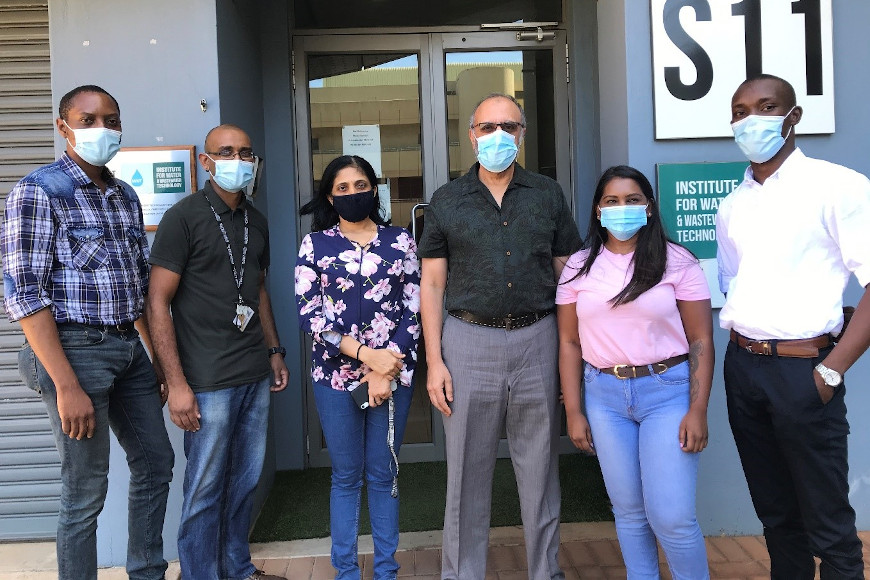Developing countries like South Africa are resource limited and often cannot embark on mass-screening programs in response to pandemics like COVID-19. Wastewater Based Epidemiology (WBE) is an emerging scientific tool that has already been used successfully in countries like the Netherlands and the USA to monitor and track the spread of COVID-19, and is proving to be quite effective in managing the fight against COVID-19 in KwaZulu-Natal (KZN).
The Institute for Water and Wastewater Technology (IWWT) based at the Durban University of Technology (DUT) is at the forefront of SARS-CoV-2 wastewater surveillance. The institute, with an array of advanced molecular biology equipment plays a critical role in monitoring and tracking Covid-19 infection spread in Durban, KwaZulu-Natal. The research team is led by the Director Professor Faizal Bux and assisted by Prof Sheena Kumari. Scientists playing a key role in the endeavour include Dr Leanne Pillay, Dr Isaac Dennis Amoah, Dr Oluyemi Awolusi and Mr Kriveshin Pillay.
WBE is based on the monitoring and constant analysis of viral particles (RNA) shed in the stool of both symptomatic and asymptomatic infected individuals by examining wastewater from wastewater treatment plants. According to the research team, monitoring the changes in viral loads in wastewater over time allows them to gain insight into the levels of infection within communities.
The Central Wastewater Treatment Plant in Durban, KZN which currently services around 61 suburbs within the eThekwini Municipality has been monitored by the IWWT team since July 2020. Monitoring of this treatment plant from July 2020 to now, has revealed that there is a clear correlation between the viral loads detected in wastewater and the number of reported clinical cases in KZN.
According to recent clinical data, the number of active cases in KZN and the eThekwini Municipality began to rise steadily since 20 April 2021, however, we have started observing the spike in viral loads in wastewater since 30 March 2021, almost 3 weeks before the actual clinically confirmed cases were reported—indicating that WBE may be used as a predictive tool for surges in Covid-19 infections and that frequent monitoring is required for future wave predictions.
KZN may already be experiencing the 3rd wave of COVID-19
According to the team, the peak of the second wave in South Africa occurred in January 2021 with an average of 40 000 active cases in KZN. As a metro, eThekwini Municipality is a good reflection of the pandemic trend in KZN. The viral loads at the Central Wastewater Treatment Plant during this peak period averaged at 4.72 log copies per 100 ml. However, viral loads over the last 4 weeks (11 – 27 May 2021) averaged at 5.57 log copies per 100 ml of wastewater—far higher than what was observed during the peak of the second wave, indicating that eThekwini Municipality may already be experiencing the 3rd wave of Covid-19 infections, and that there is a greater number of infected individuals within the community than what is currently being reported. This also indicates that there may be more asymptomatic carriers in the community that could potentially spread the virus. The team at IWWT have shared these key findings with the relevant authorities including the provincial Department of Health (KZN DOH) and the National Institute for Communicable Diseases (NICD).
It must also be noted that clinical testing is based on individuals who present typical Covid-19 symptoms, but asymptomatic individuals are largely ignored and can be potentially silent carriers of this infectious virus. There is no doubt that WBE is an effective tool in that it is inclusive of all infected persons. Considering the fact that there is a current limitation on the capacity for clinical testing, it is also suggested that WBE surveillance strategies be utilized at a national level as our data has shown with a high degree of confidence that WBE can predict surges in viral loads before clinical cases manifest themselves.
WBE is proving to be an important and cost-effective tool in the fight against COVID-19. Not only is it able to give you a snapshot of possible infection hotspot areas, but it is also able to predict surges in clinical case numbers ahead of time. According to Prof Bux, this technology can and should be expanded for application at sub-district level by testing sewage from sewer networks servicing suburbs.
Pictured: The COVID-19 research team at IWWT: From left to right: Dr Oluyemi Awolusi, Mr Kriveshin Pillay, Prof Sheena Kumari, Prof Faizal Bux (Director), Dr Leanne Pillay and Dr Dennis Amoah.
Supplied by: COVID-19 research team at IWWT.


